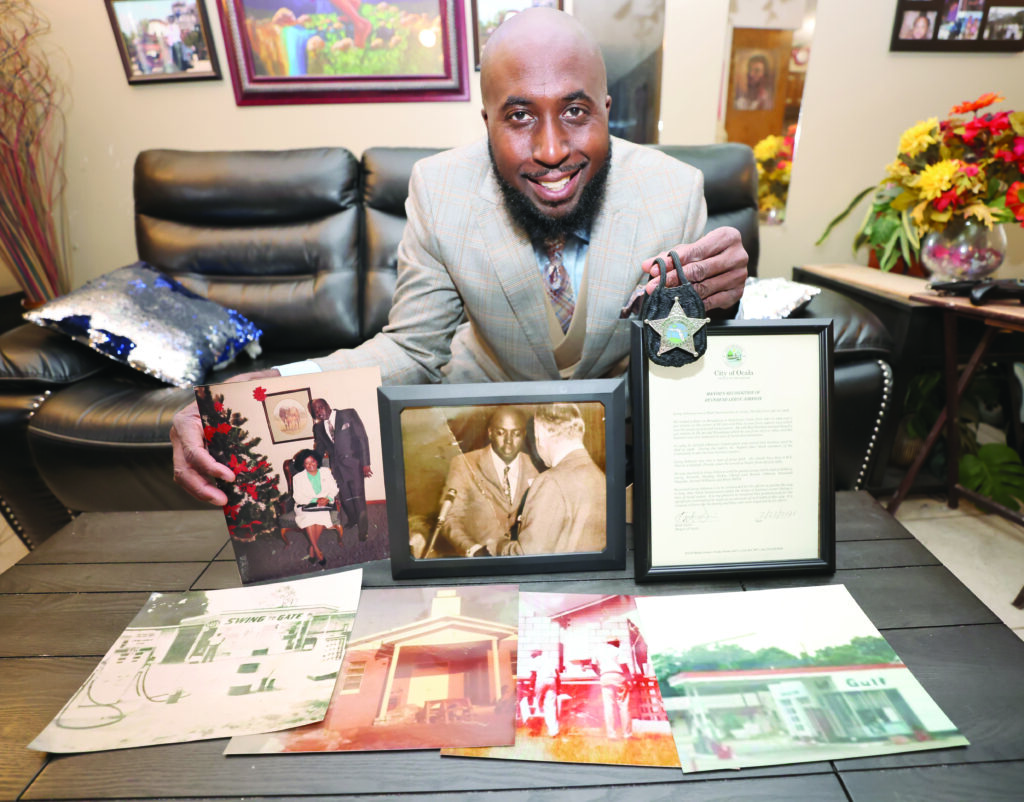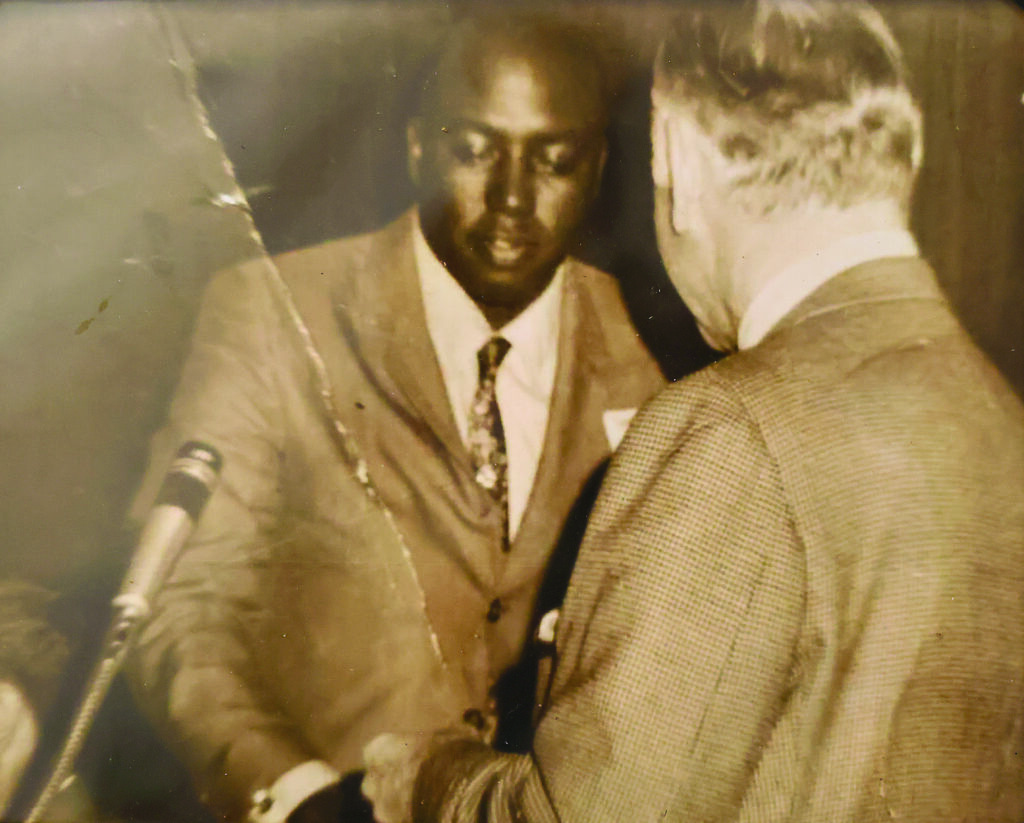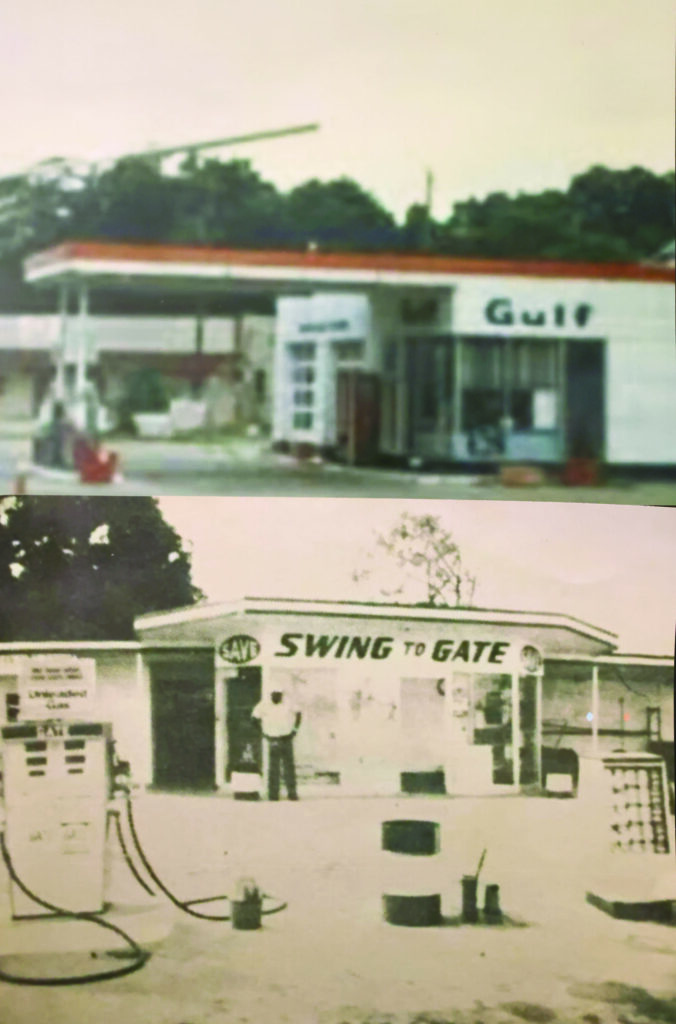Fueling a community

Larry Johnson poses with historic photos and a Marion County Sheriff’s Office badge from his father, the late Rev. Leroy Johnson. [Bruce Ackerman/Ocala Gazette]
Leroy Johnson spent his life quietly helping others

The late Rev. Leroy Johnson receives his Sheriff’s badge that was given to him when he became a Marion County Sheriff’s deputy in 1968. [Bruce Ackerman/Ocala Gazette]
While growing up, Larry Johnson never fully grasped the role his father, the Rev. Leroy Johnson, played in the history of Ocala.
He grew up knowing his father was a kind man who faced hardship, but the depths of his contributions to the Black community in Marion County remained largely unknown until after the man’s death.
Larry Johnson spent eight years researching his father’s life. Thanks to his efforts, Ocala Mayor Kent Guinn recently issued a proclamation honoring Leroy Johnson for his contributions to the area.
Leroy Johnson was born on Jan. 6, 1937 in Cotton Plant, a small farming community in southwest Marion County. He was the son of Frank Johnson, a sharecropper.
“In that time period in Ocala, black people were stuck in a rut. The women would be maids and housekeepers while the men would be sharecroppers or take care of lawns. Even at a young age, my father knew that there had to be a better way of living,” Larry Johnson said.
After graduating from Howard High School, the segregated high school in Ocala, Leroy Johnson went north to Harlem.
“My father wanted to get away from Ocala,” Larry Johnson said. “He saw (in Harlem) that Black people were not trapped by white barriers and that they were able to make names for themselves.”

Larry Johnson poses with historic photos and a Marion County Sheriff’s Office badge from his father, the late Rev. Leroy Johnson. [Bruce Ackerman/Ocala Gazette]
Eventually, Leroy Johnson decided to try and bring some of that freedom to Ocala, so he returned and bought property with the money he earned in Harlem.
“He bought a diner called Diner on the Square and he became very successful. Though there was still segregation, his soul food brought both black and white clientele to his diner. He was always very kind and giving, which he learned from his mother, Maggie Scott, and from his experience in Harlem. He would even give food from his diner to the homeless,” Larry Johnson said. “When the government abolished segregation, black people stopped coming to his diner because they went to the white restaurants. My father didn’t want to get rid of the diner, but he was losing money and didn’t have a choice, so he sold the diner and became a sheriff.”
Leroy Johnson was one of the first Black deputies at the Marion County Sheriff’s Office. During his training, however, he faced abuse. Officers spit on the ground in front of him as he crawled through the obstacle course. One lieutenant stepped on his back to keep him from finishing the course. But Leroy Johnson persisted and passed his physical and written tests.
His trials didn’t end there. Vandals struck his patrol car, slashing his tires and breaking out windows. He eventually quit and in 1969 bought a Gulf gas station on the corner of Pine Avenue and Southwest 10th Street. A Wawa convenience store now sits on the old Gulf station property.
More vandalism followed. Broken windows and racial slurs painted on the walls were common. He even got death threats from the Ku Klux Klan, Larry Johnson said.
But again, Leroy Johnson persisted and even loaned money to those in the local Black community who wanted to start businesses of their own.
In 1973, he sold the Gulf station and bought the GATE gas station on the corner of Southwest 13th Avenue and State Road 40. Things only got worse.

Two gas stations that the late Rev. Leroy Johnson owned, a Gulf Station which was at the corner of Pine Avenue. and SW 10th Street from 1969-1973, and a GATE Gas Station (1973-1984) are shown in photos. [Bruce Ackerman/Ocala Gazette]
“The death threats from the KKK escalated, so my father began carrying a pistol on him at all times for his own safety. He wanted to be protected, but the death threats did not scare him,” Larry Johnson said.
As a 6-year-old in the mid-1980s, he remembers witnessing a confusing incident.
“I was leaving for school and my dad was leaving to open the gas station. I saw a piece of paper in my dad’s hands that looked like the ghost in Scooby Doo, but I would later learn that it was a threat from the KKK. My dad was still dealing with racism into the ‘80s, and did for most of his life,” Larry Johnson said.
His father served as pastor at New Zion A.M.E. Church in Raleigh and later, Bethel A.M.E Church in Gainesville.
“When people were short on money and needed gas, my father would write a receipt and allow them to pay him at a later date when they could afford it, and the same with kerosene. He knew the plight that Black people were facing and would do anything he could to help people,” he said.
Leroy Johnson eventually sold the gas station, which is now a restaurant, after the corporate office forced him to go self-service.
“They told my dad that he had to stop pumping gas and checking peoples’ oil. He refused to do that, because he viewed it as a community gas station,” Larry Johnson said.
He then opened a construction business and served as pastor of Bethel A.M.E until his death in 1998.
“After my dad’s death I always had people thanking me for my dad’s acts of kindness,” Larry Johnson said. “Until that point, I didn’t realize that my dad was such a big piece of Marion County history.”





